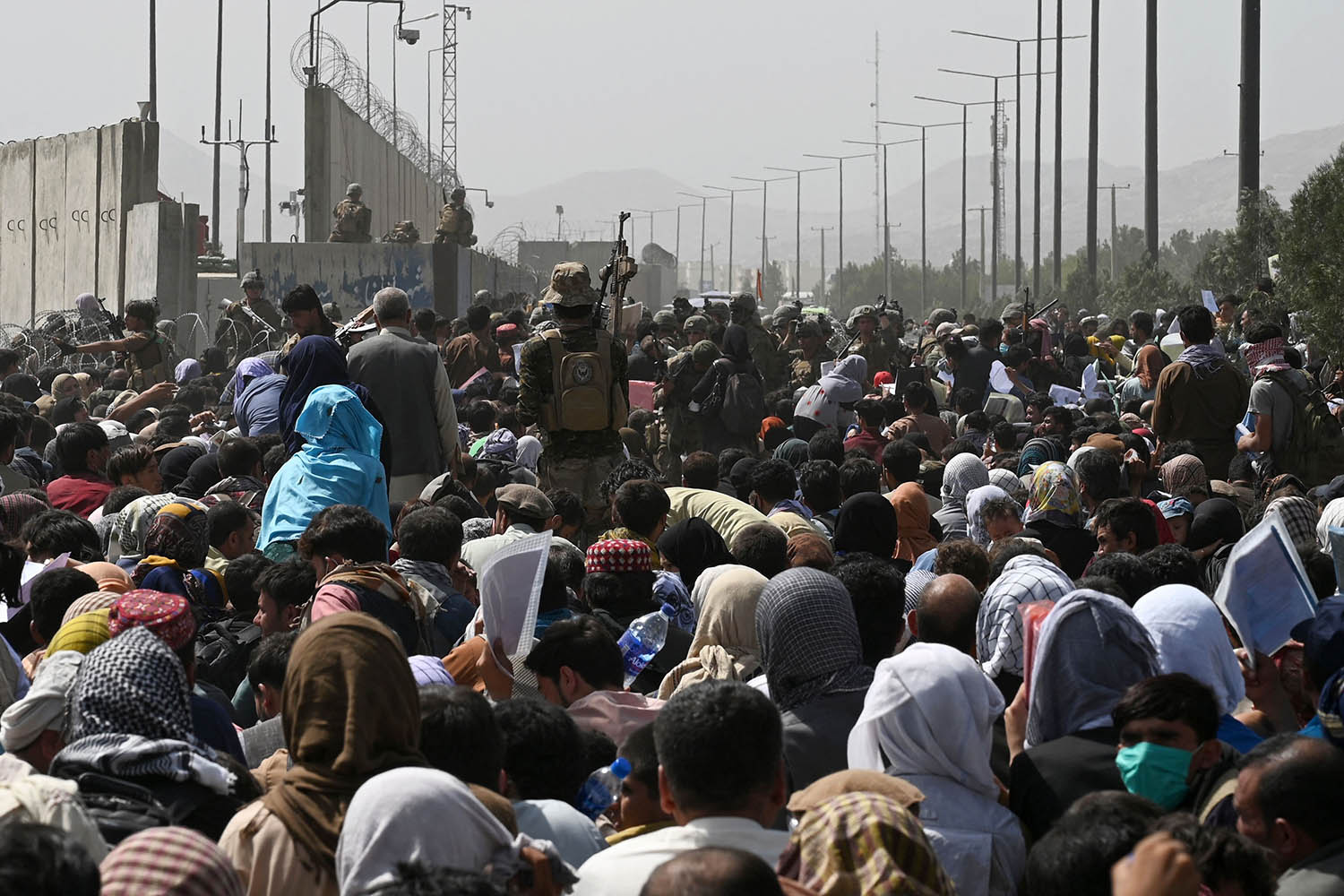Kabul is a sprawl of city, folded into a narrow valley within the Hindu Kush. We arrived under the cold blue skies in March 2012 and the streets smelled of post-conflict reconstruction – of diesel and wet cement – and of optimism tempered by fear that the impending snowmelt would bring a spring offensive.
I remember the colours. Dust caught in the light – ochre, umber, gold – changing by the hour. Crimson pomegranates piled high on barrows. A woman drifting through the market in indigo. Boys kicking at a deflated ball while men sat against shop walls, smoking and grouching.
The air felt thick with the country’s history. Pride, resilience, resentment, acceptance; all there, baked into every face, every transaction, as though bartered along with the sacks of carrots and secondhand shoes. But then we drew up to a shabby building painted with the words “The future starts here” and Kabul became so much more than a travel curiosity.
I’d been itching to go to Afghanistan when Christa – my friend and a journalist at Vogue – told me she’d inherited a school there. A school? Inherited? In the late 1990s, her mother, Frances D’Souza, bumped into a young Afghan – Aziz Royesh – in a Pakistan refugee camp. Aziz had no formal schooling, but a fierce dream: to educate girls in his home city of Kabul. Frances, a human rights activist, now Baroness D’Souza, promised to help.
After the Taliban were routed in 2001, Aziz returned to Kabul and went door-to-door, attempting to convince parents that daughters deserved the same shot at learning as sons. Scepticism turned to pride as the girls excelled, then brought home diplomas.
Fast-forward a decade, and the school had 2,000 students studying philosophy, democracy, art and humanities. By the time I came along, the headmaster’s impossible dream looked like a small miracle. But D’Souza’s role as speaker of the House of Lords precluded visits to “troubled” places and Christa found herself with a somewhat lonely inheritance. I pretty much insisted on working with her.
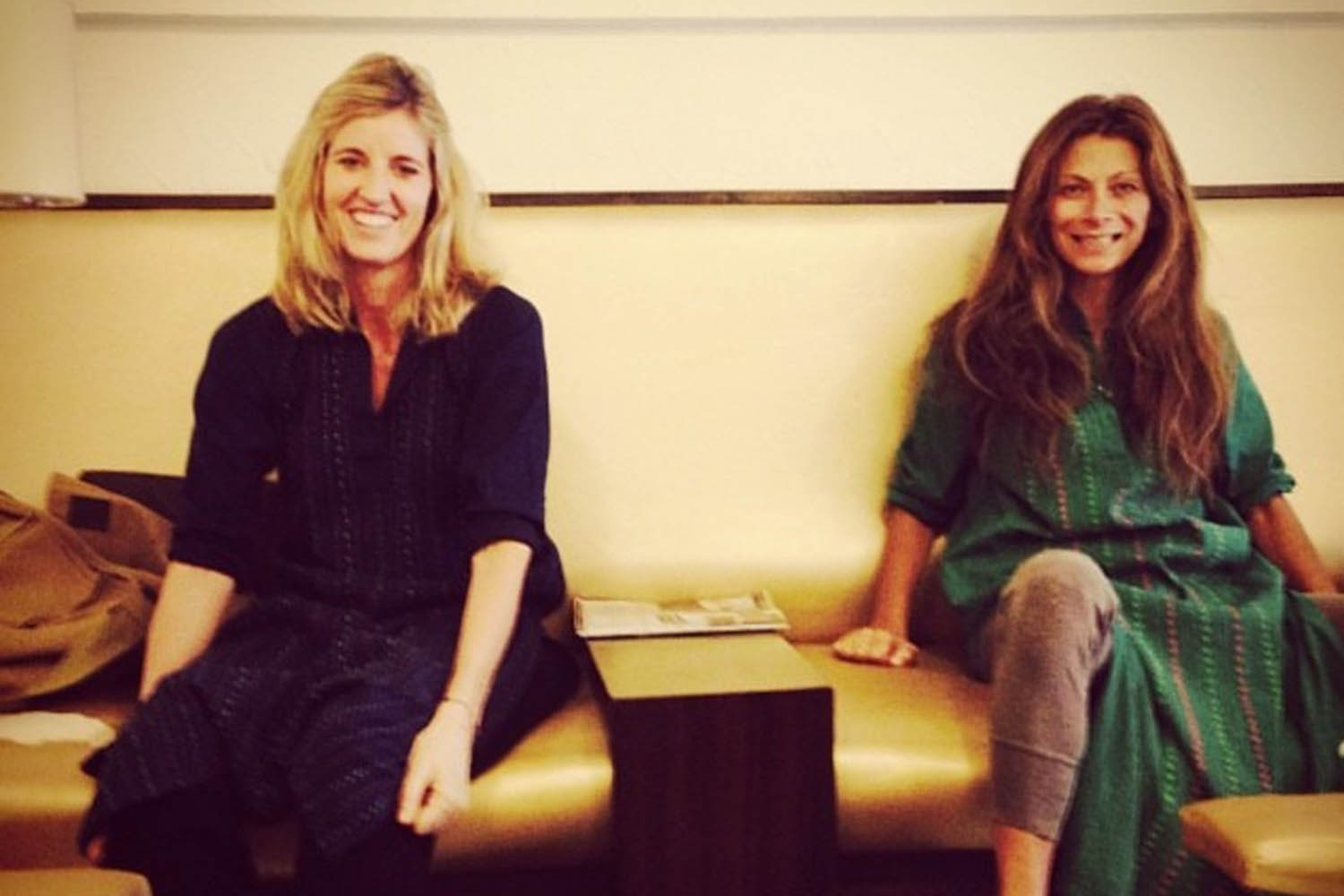
Bella Pollen, left, and Christa D’Souza
In the courtyard, we were greeted by a shoal of pale faces in hijabs, clutching their books like tickets to somewhere better. If the first years were electric with excitement, the older girls were clear-eyed with purpose. No teen boredom or western complacency here. Good God, that determination to get where they needed to go – I was blown away.
“Not for these girls the long arm of political change,” I wrote at the time. “They have witnessed their mothers and grandmothers put up and shut up. Education is their generation’s revolution.”
But as we stood in those classrooms that first day, watching hands shoot into the air – girls clamouring to be part of their beautiful, broken country – I felt scared, too. People have always paid in blood to live in a world of their choosing. What would happen to their dreams under the ominous return of the Taliban? Catching my expression, Sughra, a quiet 16-year-old, laid her hand on my arm. “Don’t forget us, Miss,” she said solemnly. “Please don’t forget us.”
Back then, Christa’s and my job was to raise things: morale, awareness, funds to rebuild. All proof, somehow, that people far away cared. And why wouldn’t they? Weren’t we all beneficiaries of other women’s battles for rights? Women who paid it forwards so we could pursue our own dreams?
Sporadic violence was always a part of Afghanistan’s enforced peace but getting there became harder in the months and years after that first visit. One bitter January evening in 2014, we stepped out of our safe house in the heavily guarded diplomatic district of Kabul. Delayed a little by Christa needing to dry her long hair, we were arguing half-heartedly about where to eat – La Taverna, our favourite, or somewhere new?
Suddenly, the world around that choice splintered. La Taverna, only a few hundred metres away, was famous for its homemade chocolate cake and the charm of its owner, Kamel, who served wine in teapots. Places where you could laugh, smoke and pretend things were normal were rare in the city and this one was cherished by Afghans and westerners alike.
Shaken by the bomb blast, we hid in the safe house, the lights cut, listening to the sharp rhythm of gunfire. Staccato, loud. We told ourselves it was the Afghan National Security Forces. That they’d arrived quickly. That things, maybe, were under control. Only later did we learn it wasn’t the security forces. It was the Taliban, shooting diners at their tables. Twenty-one people died that night at La Taverna, Kamel included.
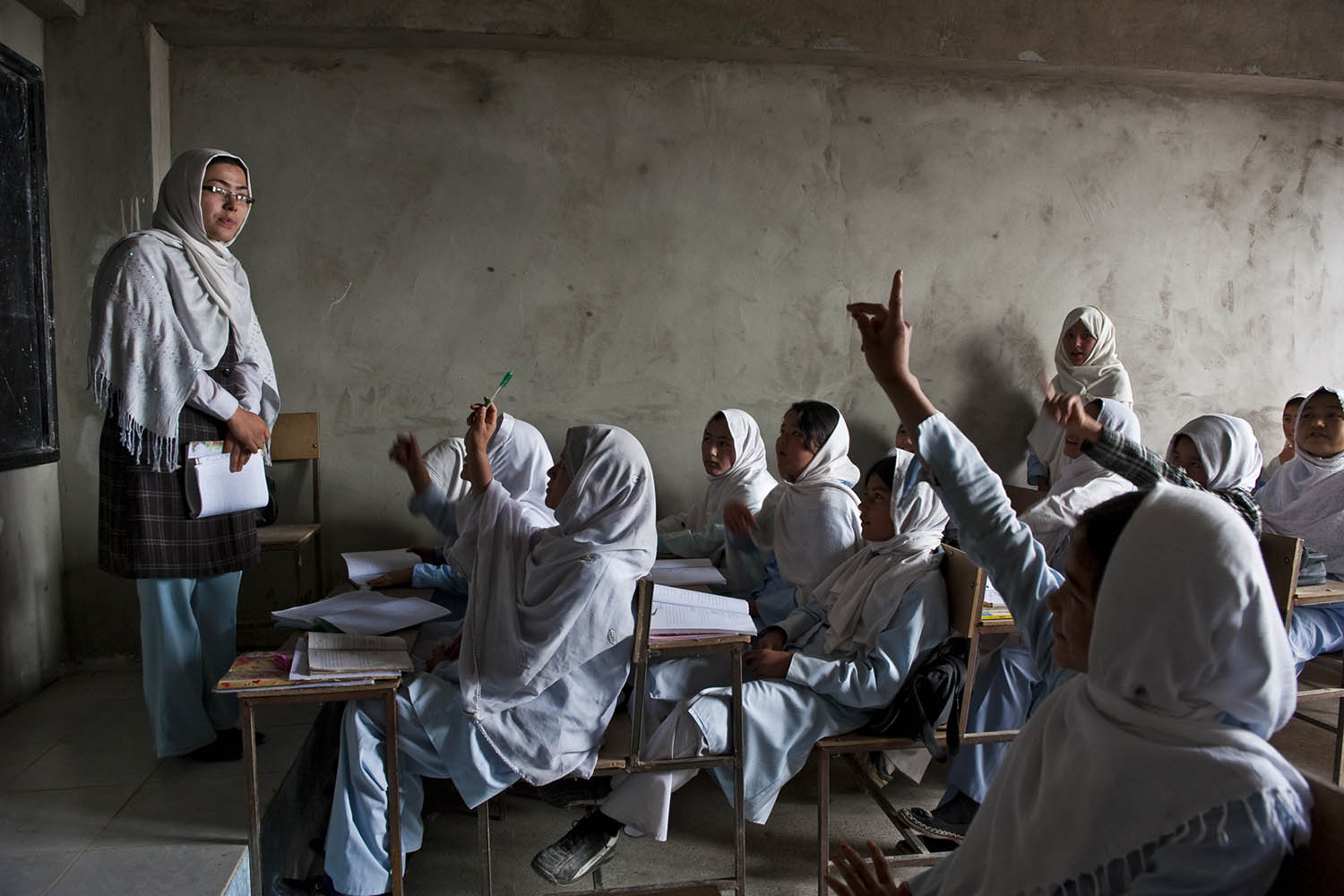
Pupils at the school outside Kabul, which was set up with the help of Christa’s mother, former House of Lords speaker Baroness D’Souza
After that, every trip to Kabul was cancelled. Bombs, kidnappings, Islamic State’s slow creep into the country. As our security guy Nate was fond of reminding us, a couple of British writers with parliamentary ties would make great hostages. Frustrated, Christa and I tried to support the school and its work remotely, but the notion of an enduring peace began to feel increasingly tentative.
Aziz’s people are Hazara. Anyone who has read Khaled Hosseini’s The Kite Runner will recall the Hazaras as the most persecuted minority in the region. In the teeth of everything forbidden, it was astonishing that his school flourished; an orchid in the barren ground of resistance from traditional clergy, ministerial authorities and the aching realities of poverty. Aziz was a diplomat. Year after year, he managed religious, cultural and political constraints with aplomb. And the school kept on growing. So while in London we ignored mutterings about a US withdrawal, those excitable first-year pupils we had met grew into teenagers, the teenagers into graduates; and for a halcyon period their voices could be heard – on radio and television, speaking out for democracy and civil rights. They sang, they painted, they held opinions, and sassed their parents. They had a future.
But then it was May 2021, and the US president, Joe Biden, was abruptly pulling the plug on “America’s longest war”. Militants had already begun raining down hatred on the Hazara community. They blew up mosques, social centres, even a maternity unit. Students at the neighbouring school to ours dared to launch a protest.
“We are the children of human beings,” their cardboard placards read. “Please don’t kill us with your prejudice and discrimination.” In response, they were gifted a car bomb; 90 girls were killed.
It was year two of the Covid pandemic. I was barely back in London after quarantining in Egypt, when I received a WhatsApp from Aziz: our school was next on the list. Panicked, Christa and I rang our friend Jeff Stern, a US-based author who had written a book about the school. We tried to convince Aziz to keep the students at home. “No way,” he texted. “Education is the girls’ only hope.”
By June, he was receiving death threats of his own. Still, he wouldn’t budge, but as the Taliban forged an unstoppable line to the capital, his tone began to change. “For the first time in my life, I feel helpless against the hardship of living,” he told us. “The Afghan people cannot stand against such a threat.”
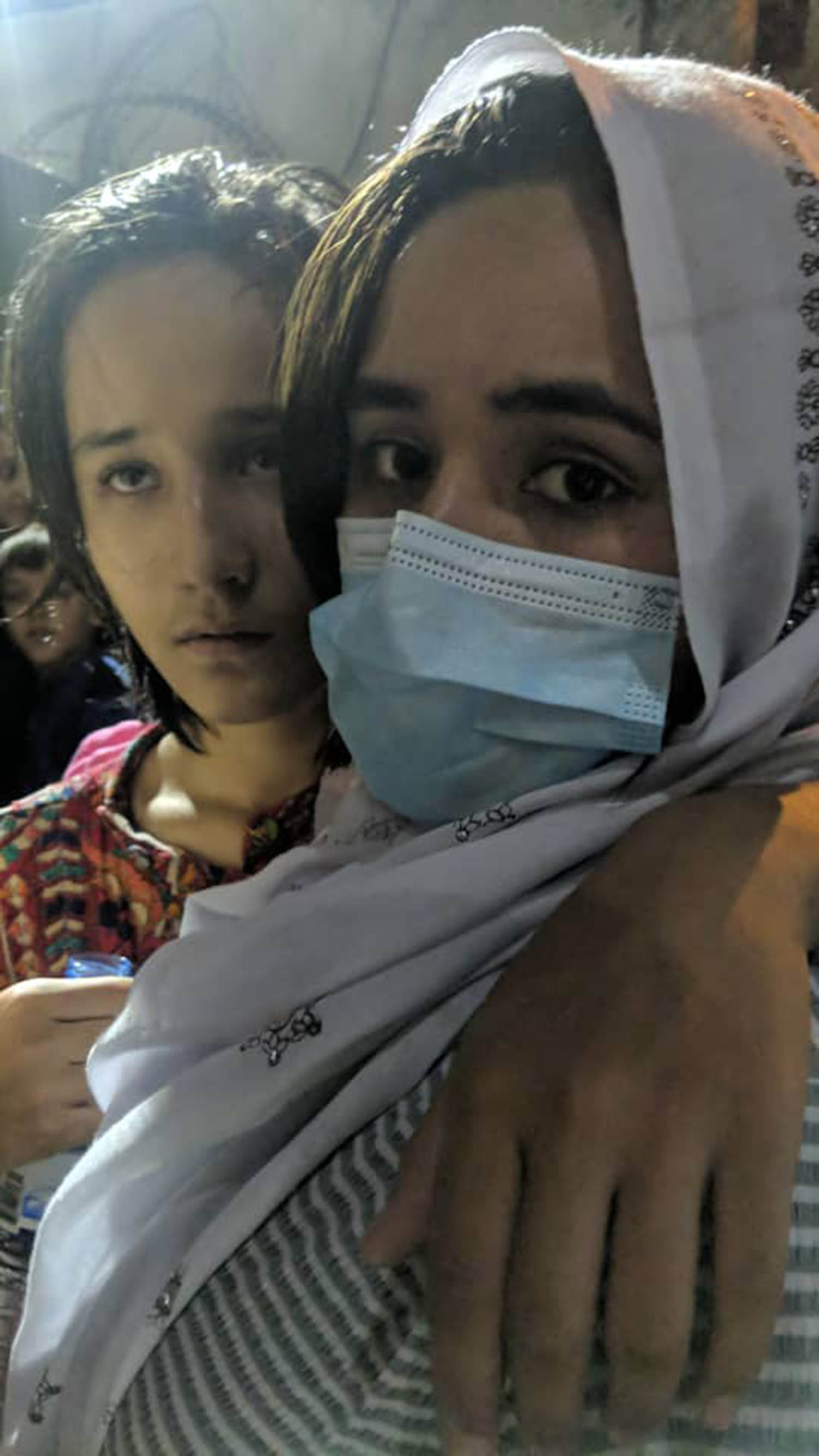
Headteacher Aziz Royesh’s daughters at Kabul airport in August 2021
In July the threats escalated to include his four daughters, young son and pregnant wife. Finally, he succumbed to pressure. He would leave Afghanistan, hoping his absence might lower the school’s profile. One problem: only two of the family had passports. None had visas. There was only ever one way out – – of Afghanistan and that was with both.
Aziz’s eldest son, Abuzar – Stanford-educated, tech-minded – lived in San Francisco. We opened regular Zooms. “Passports should be pretty quick,” he said. So we played by the book. Applications in Kabul. Asylum requests to the UK.
Aziz had a hell of a CV: a runner-up for Bill Clinton’s Global Teacher prize, a believer in institutions and meritocracy. We got him a visiting post at the London School of Economics, secured scholarships for three girls but the Home Office wouldn’t budge. No explanation. No urgency. Just a flat no.
Meanwhile, Afghanistan collapsed in slow motion. Civil services frayed, then snapped. Aziz – who had steered his students to Yale, who advised the country’s former president Ashraf Ghani – was soon slipping dollars to an official in the bowels of the passport office.
In London, we stopped using email and downloaded the more secure Signal. Abuzar called a college friend. Justin Hefter had form: he once evacuated someone from Yemen. We were now a team of five.
Our eventual name, 30 Birds, references a 12th-century Persian poem in which 1,000 birds embark on a perilous journey seeking enlightenment, only for the surviving 30 to realise that the power they sought lay within themselves. If this was a metaphor for the story we found ourselves in, it didn’t feel like a story yet. More like a mess of confusion, red tape and indifference.
What held it together was the belief that if we followed every rule, ticked every box, someone, somewhere would have to say yes to us. But that wasn’t how the system worked. That’s because there was no system. Just a waiting room with no door.
As Afghan cities fell, we burrowed deeper underground, muscled in on an ex-SAS group chat, had some pretty weird calls with mercenaries. We used the word “extraction” a lot, without irony. We mapped routes to anywhere that didn’t need visas. Sri Lanka, Uzbekistan – the Maldives, of all places. Occasionally, something looked promising, then everything would fall apart. Our Uzbek pilot skipped the country. The passport guy Aziz had bribed was arrested.
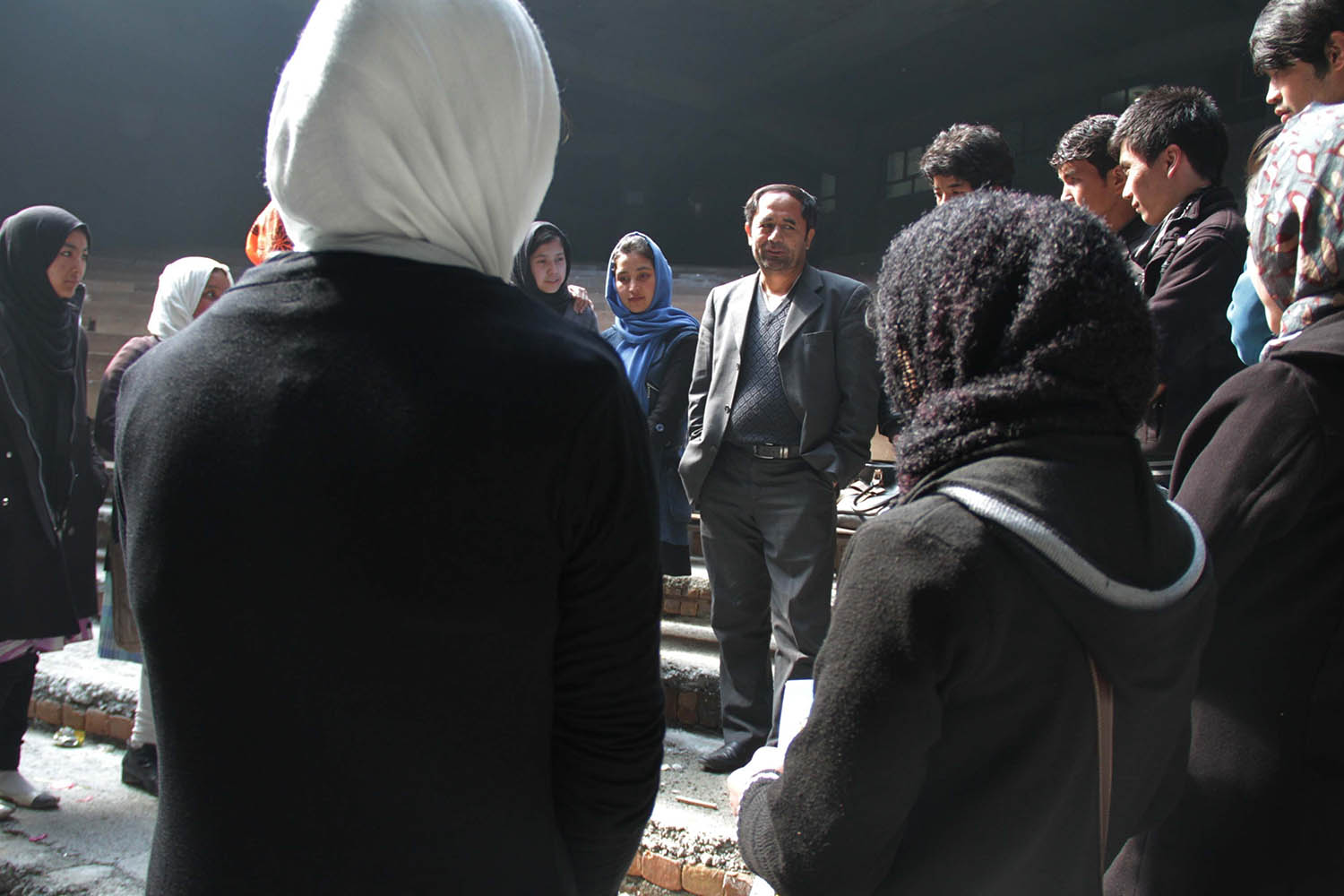
Aziz Royesh talking to pupils at his school
Kabul jittered with fear. Aziz ordered the teachers to destroy all school records. There were rumours that the Taliban were going door-to-door. Aziz’s family went into hiding and that was it. The beginning of what happened next.
Except it’s hard to write about what came next. Not because it was unbelievable – though it was – or because it was traumatic; that hit later. It’s hard because there’s no language for a certain kind of fear. The fear of holding someone else’s life in your hands. Christa and I were writers and mothers. We barely knew our arse from our elbows when it came to this stuff; it wasn’t our job, goddammit – and yet there we were.
Tens of thousands of Afghans who were qualified to leave the country would ultimately be abandoned in the chaos. Aziz’s family – the family we knew – didn’t qualify for any special treatment. They were on nobody’s list except ours.
For reasons that escape me now, I was house-sitting for friends near Oxford. They’d installed state-of-the-art systems – hot water, an oven – that required instructions. I was meant to be working on a pitch deck for a TV series, something with structure and a clear arc. I kept locking myself out of the house. The puppy got loose. I was running through woods in borrowed gumboots, calling its name, while dictating Afghan ID numbers over the phone to a civil servant whose voice told me she wasn’t writing anything down. Then even the helplines went silent. The army stopped picking up.
Videos began circulating on Signal. Torture and executions. I stopped watching the news. I knew if I saw those airport scenes – mothers tossing their babies to soldiers, young men falling from the wings of planes – I’d stop functioning. Mid-August and our Zooms were running all day. We slept in fits and shifts. Christa and I found someone, a friend with the defence secretary’s private number. “Get him on the phone now,” we begged. “My loves,” he said gently. “It’s three in the morning.”
It probably wouldn’t have made a difference anyway. Sometimes, I saw red. If it’s like this for us, with contacts, money and access … But who did that kind of outrage help? My brain felt shredded.
Justin, though, stayed calm. “Stepping stones,” he said. “Build them one at a time, and I promise you, we will get them out.” He and Jeff also had contacts. And those contacts gave us our break. A Harvard classmate led to a congressional aide, who led to an ambassador, then a senator, then a general, then a professor at West Point who knew of a marine attache in touch with a secret special forces cell who had the number of a marine working one of the airport gates.
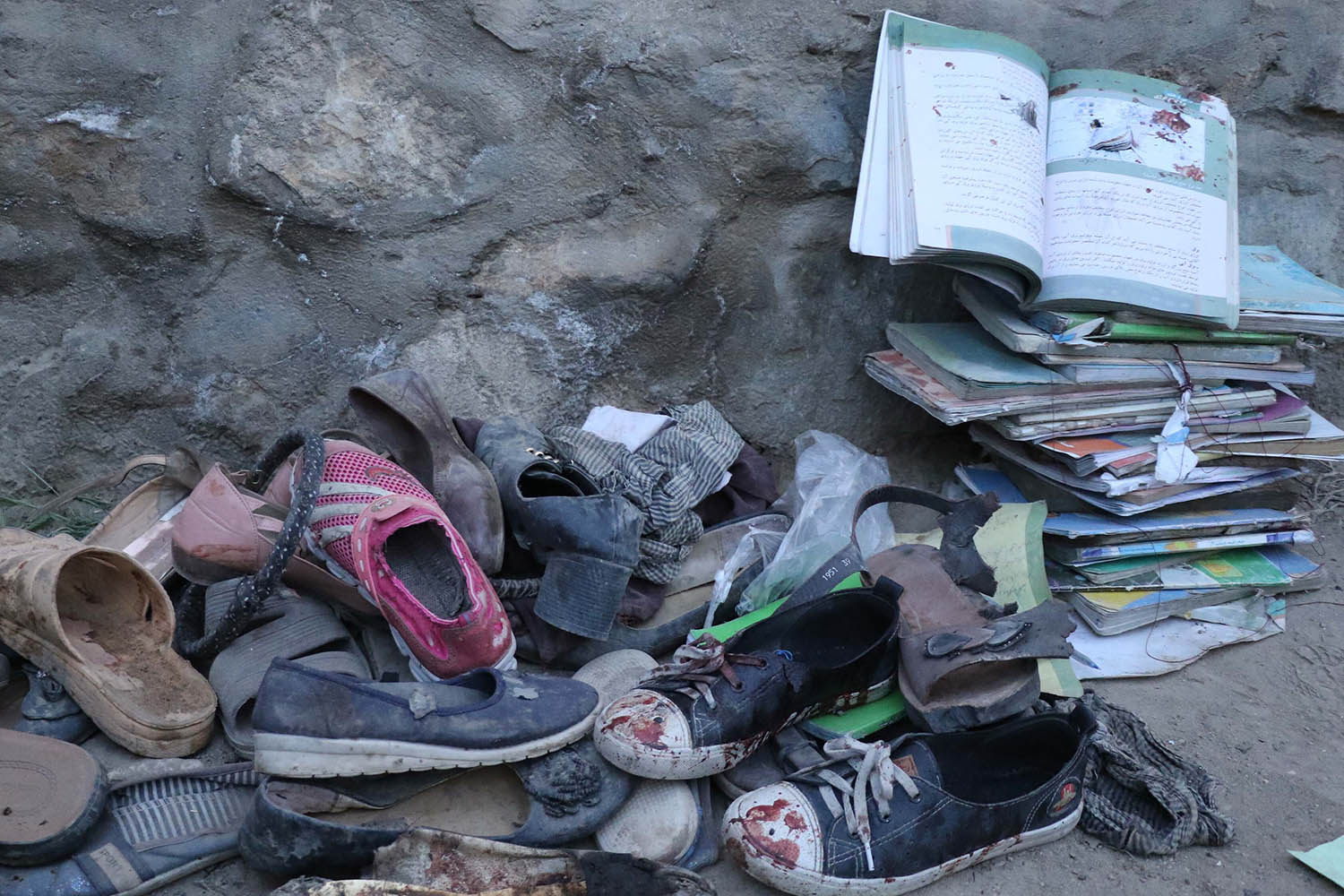
Schoolgirls’ possessions after the bombing of a school in Kabul in May 2021
And now we had a plan. The first time we green-lit the headmaster’s family out of hiding, a lag in our intel sent them straight into a group of celebrating Taliban. The second got them to the airport but after hours in the crush, Aziz’s youngest daughter fainted. We had to abort.
Only then did we appreciate that Aziz’s wife was not just pregnant, but nine months’ pregnant. Time was running out. Such was the allied mayhem that visas and passports were now redundant. Get them through that airport gate and some plane – anybody’s plane – would airlift them out.
The third attempt was a Hail Mary. It started fine, then we lost contact with the family for more than an hour between Taliban checkpoints. Inside his little box on Zoom, it was the only time I saw Abuzar flinch. Then, suddenly, they were at the gate. We scrambled – emails, letters, every scrap of endorsement we’d begged and borrowed. It wasn’t enough. But at last, their names showed up on some random Albanian manifesto. The scales tipped and they were in.
I cried when Aziz sent selfies from those plastic airport chairs. Harsh lighting, smiling for the camera, a mile of trauma tunnelled behind all their eyes. The team exhaled, showered, slept – and woke to hundreds of WhatsApp messages from the students. Kabul had fallen.
Only then did the full extent of our responsibility kick in. The school now had 4,000 kids. Education had been our weapon of peace: push as many girls through the system as possible, build a generation of doctors, teachers, writers, leaders. Justification had always come so easily. But here was the penalty for the numbers game we’d played. We’d turned those same girls –bright, ambitious – into targets.
And so we started again. Some family, some faculty members, but mostly students: 16, 17 and 18-year-old girls. This time, our list had more than 450 names.
How to squeeze the rest into one paragraph? It involved moving huge groups around the country in secret; a Russian plane that never took off; a tip-off that kept the girls from being blown up at the airport. It took the courage of fathers letting daughters go; the guts and organisational skills of the girls themselves. It took a sympathetic Pakistani minister and four more extraordinary people on our team, which now formalised as the 30 Birds. It took the then Prince Charles and slum landlords, $4m and 60 pro bono lawyers. It took a thousand strangers and friends and 18 miserable months in hiding while we negotiated with Ecuador, the Netherlands – anyone who would listen.
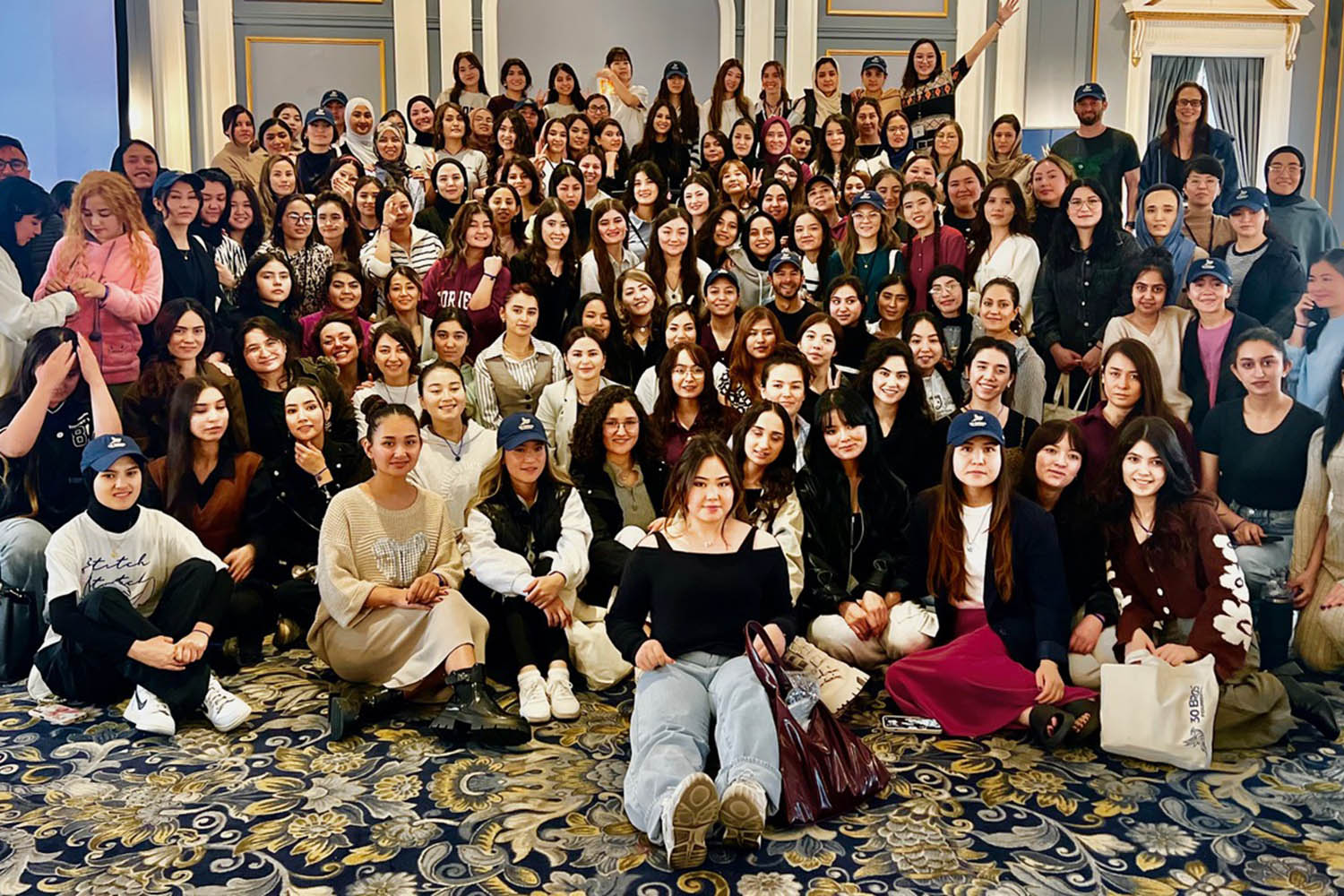
Some of the schoolgirls after their safe arrival in Canada
It took something out of all of us. And it left an awful lot behind. Four years on, all the 450 girls have been resettled in Canada; the 30 Birds looks after them and they’re thriving. Their long black hair swishes freely or is chopped into sharp bobs. Some wear sleeveless dresses, some like hoodies and trainers. In other words, they’re just girls, figuring it out, but they’re safe.
And every one appeared to hit the ground running. Nila won the 2024 International Children’s Peace prize. Parwin made her university archery team. Soraya is getting her commercial pilot’s licence.
Back home, though, thousands more like them are holding on by their fingernails. For all the success of those we got out, the real story, the one I’m reminded of every day on WhatsApp – “Miss, any news?” “Dear sister, I’m losing hope” – is those we couldn’t.
The 30 Birds is a foundation in three countries now. It has swallowed mine and Christa’s lives – Justin’s too – and we’re glad of it. At present, we look after about 5,000 girls in ways it isn’t always safe to put into print. Still, it’s not enough. And we never tell ourselves it is, because if freedom only exists in one corner of the world, then it’s not freedom at all. It’s just luck, and luck, as we’ve all seen, runs out.
For centuries, Afghanistan has been catnip to outsiders – to armies, empires, big ideas. People show up, wanting to fix or claim or save. Then they leave. What’s left behind is often rubble and rules. Especially for women. Since the fall of Kabul, those rules have become impossibly tighter. No school, no work, no travel without a man. No parks, no sports, no beauty salons, no singing, no speaking outside, no joy – and with every new loss, the girls ask: do they have a life worth living?
It’s hard to know how to help. Western pressure, it turns out, can make things worse when it doesn’t understand the culture it’s pressing on. Women have fought hard to be more than visitors in a man’s world. But if here we’ve gained so much ground while elsewhere women are being pushed back to the edge of existence, then how can we say the job is done?
So we keep going. We’ve learned a lot, and one lesson is that things don’t get changed by shouting – they get changed quietly. We can’t fix Afghanistan. But we can do something. If only finding a way to say: we remember you, we know you and we haven’t stopped believing you deserve more than just survival.
Newsletters
Choose the newsletters you want to receive
View more
For information about how The Observer protects your data, read our Privacy Policy
Photographs Courtesy of Bella Pollen and by Getty Images, Lynsey Addario, AFP/Getty Images, Anadolu Agency
